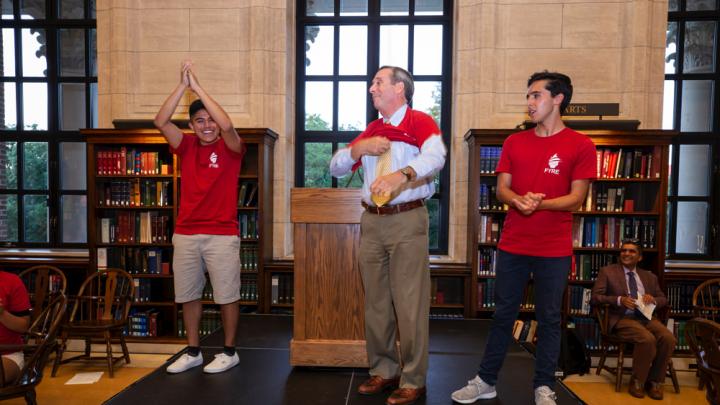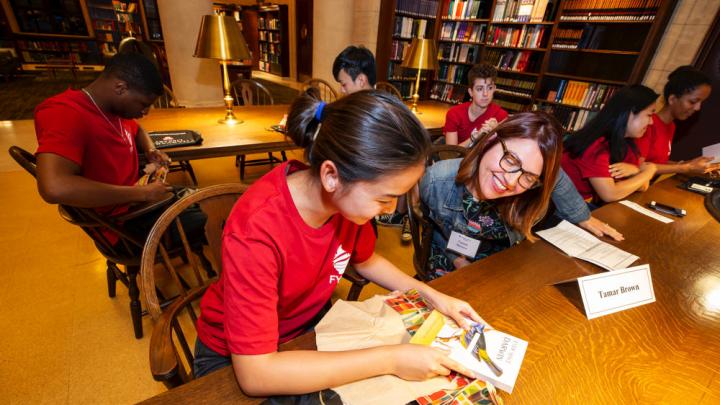Last Thursday, University President Lawrence Bacow welcomed his first group of Harvard undergraduates, about 100 participants in the new First-Year Retreat and Experience (FYRE), a four-day pre-orientation program for first-generation, low-income, and other students not traditionally represented at Harvard. Harvard is a place of “insurmountable opportunity,” he told them. “If you don’t know where to go, just ask. Everybody is here to help you.” The first-years sat anxiously around tables in the Loker Reading Room of Widener Library with their FYRE “families” and upperclassman student leaders, each with a neatly wrapped book chosen by a Harvard professor, staff member, or graduate.
The reception’s location was meant to familiarize the first-years with Harvard’s library resources, and with its often daunting, imposing spaces. Andrew Pérez ’20, a first-generation student and a co-chair of FYRE, said it was his first time ever being in Loker. “I’ve always felt intimidated to be here,” he admitted. “I felt like I had to know what I was studying. I had to have an action plan. Everyone seemed so serious and focused. The one thing we want you to take from this space is that it’s your space.”
FYRE’s inaugural year reflects Harvard’s recent interest in better supporting low-income undergraduates. Since the start of its Financial-Aid Initiative, the policy that makes attendance at the College free for low-income and some middle-income students, the share of students who are the first in their families to go to college has grown. First-generation students represented 17 percent of the admitted class of 2022. At the same time, the experience of first-generation students at Harvard and elsewhere has shown that merely being admitted is not enough; schools also need to help those students transition to college-level academics and social life, as some of Harvard’s peer universities have done through multiweek bridge programs.
Bacow left the students with “a few pieces of advice” before he addresses them again at freshman convocation next week: to “be generous with your time to your classmates,” and to not feel as though they needed to have their lives planned. “Your future is just unimaginable; all of you are going to do amazing things, and it’s going to be fun for the rest of us to help you get there.” He continued: “You will meet many Harvard alumni who met their spouses in their class, often during the first week of school. If statistics are any indication, that may happen to some of you—so keep your eyes open.” The group was also addressed by Rakesh Khurana, dean of the College.
FYRE’s programming included introductions to academic, professional, and mental health resources, and the social culture at Harvard; it’s also intended, through its student leaders, to create a support system that the first-years can look to throughout college. “When it gets stressful, when you encounter problems that you’ve never seen before—that’s when you turn to us,” said FYRE co-chair James Bedford ’20.
Thursday’s event also marked the start of the First-Year Librarians (FYL) program, which pairs each of the students with a University librarian who will introduce them to the library system, and the skills needed to conduct research. A librarian from the program sat at each of the student tables. Sarah Thomas, vice president of the Harvard Library, spoke about her own story, from a small mill town in Massachusetts with a one-room library to running Harvard’s library system. “I want you to own these spaces,” she said.
The next evening, FYRE participants packed into the Cambridge Queen’s Head with faculty and staff members from across the University, who told their own stories of success, failure, challenge, and surprise during college. One theme that resonated across all of them: all successful people have had countless untold failures, and often don’t recognize their own successes. No perceived failure was final; it was never too late for the students to reinvent themselves. David Atherton ’00, assistant professor of East Asian languages and civilizations, remembered returning for a visit to campus eight years after he graduated, while he was in graduate school, and suddenly feeling that he was a failure. “To whom had I failed?” he asked. “If you feel you’re a failure, it doesn’t matter what anybody else says. It’s between you and yourself.” (That he returned as a faculty member makes the point).









